International Finance Report: Barclay Analysis
VerifiedAdded on 2020/01/07
|12
|3307
|108
Report
AI Summary
This report provides a comprehensive analysis of Barclay's financial performance within an international finance context. It includes a detailed ratio analysis, evaluating profitability and liquidity. The report explores various valuation methods such as net asset valuation, price-earnings ratio, and dividend valuation, applying these to Barclay's data. It also discusses risk exposures faced by FTSE 100 companies and circumstances surrounding acquisitions. The report concludes with recommendations for Barclay, suggesting listing on the stock exchange, and emphasizes the importance of financial stability for such opportunities. The analysis is supported by a list of references.

INTERNATIONAL FINANCE
Paraphrase This Document
Need a fresh take? Get an instant paraphrase of this document with our AI Paraphraser
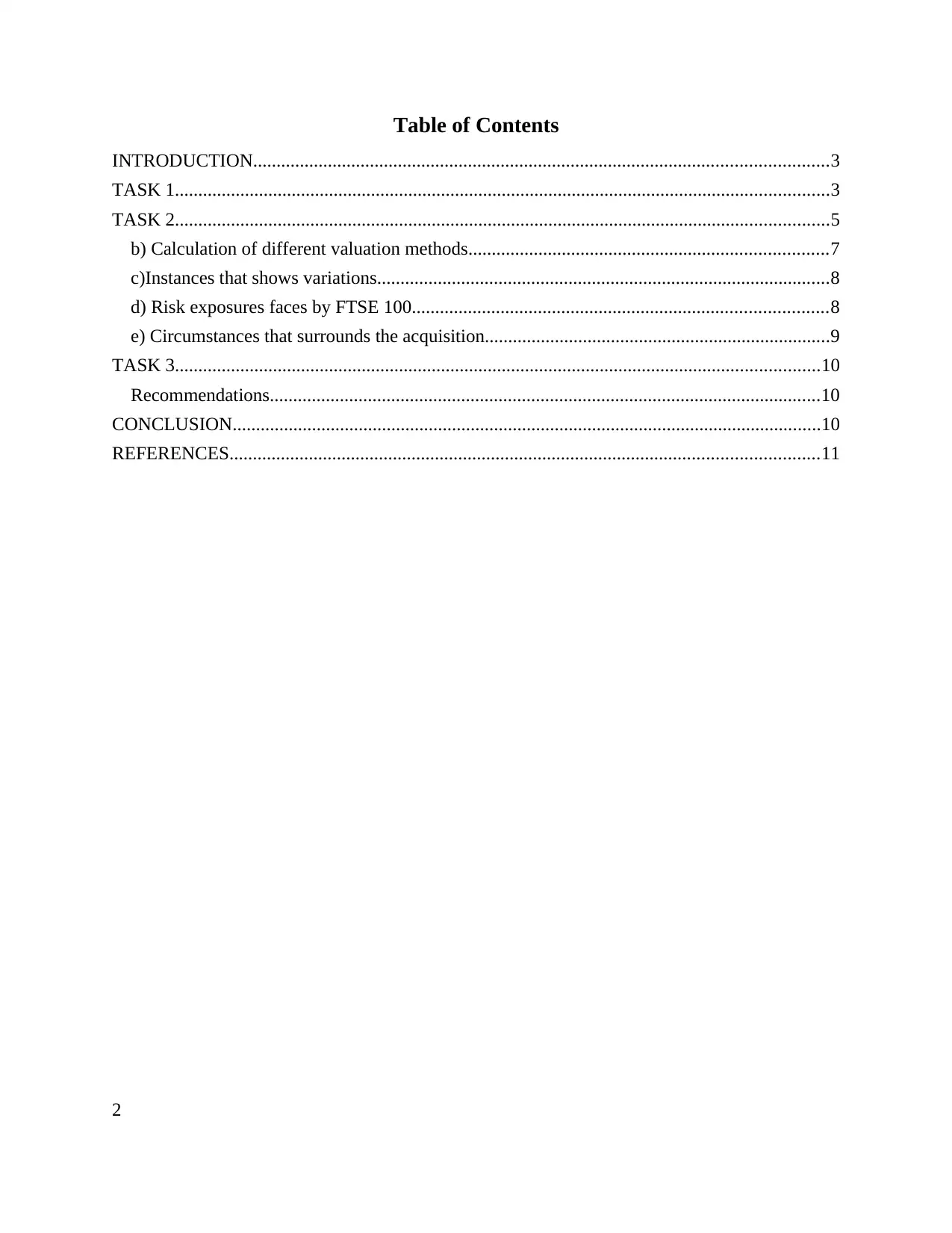
Table of Contents
INTRODUCTION...........................................................................................................................3
TASK 1............................................................................................................................................3
TASK 2............................................................................................................................................5
b) Calculation of different valuation methods.............................................................................7
c)Instances that shows variations.................................................................................................8
d) Risk exposures faces by FTSE 100.........................................................................................8
e) Circumstances that surrounds the acquisition..........................................................................9
TASK 3..........................................................................................................................................10
Recommendations......................................................................................................................10
CONCLUSION..............................................................................................................................10
REFERENCES..............................................................................................................................11
2
INTRODUCTION...........................................................................................................................3
TASK 1............................................................................................................................................3
TASK 2............................................................................................................................................5
b) Calculation of different valuation methods.............................................................................7
c)Instances that shows variations.................................................................................................8
d) Risk exposures faces by FTSE 100.........................................................................................8
e) Circumstances that surrounds the acquisition..........................................................................9
TASK 3..........................................................................................................................................10
Recommendations......................................................................................................................10
CONCLUSION..............................................................................................................................10
REFERENCES..............................................................................................................................11
2
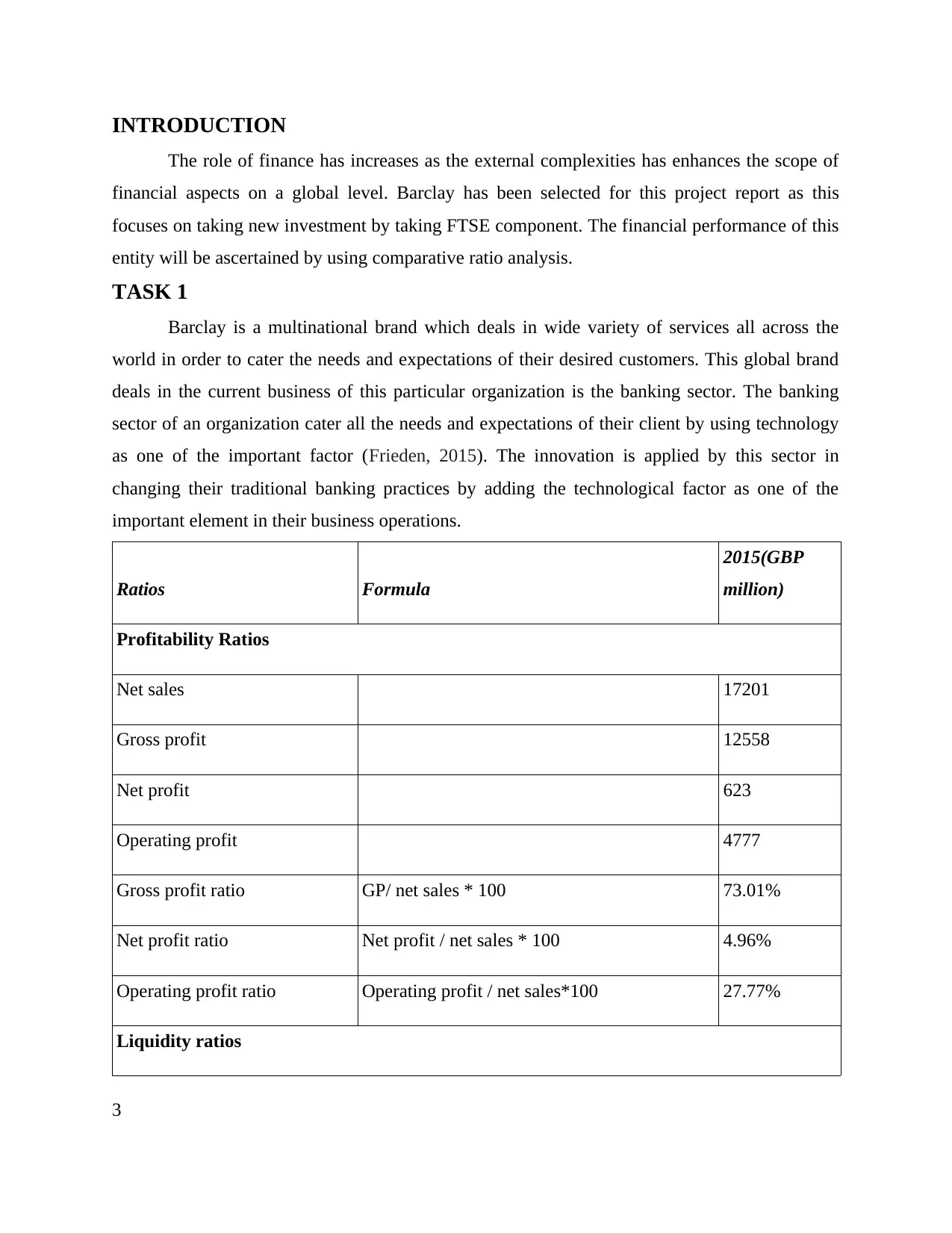
INTRODUCTION
The role of finance has increases as the external complexities has enhances the scope of
financial aspects on a global level. Barclay has been selected for this project report as this
focuses on taking new investment by taking FTSE component. The financial performance of this
entity will be ascertained by using comparative ratio analysis.
TASK 1
Barclay is a multinational brand which deals in wide variety of services all across the
world in order to cater the needs and expectations of their desired customers. This global brand
deals in the current business of this particular organization is the banking sector. The banking
sector of an organization cater all the needs and expectations of their client by using technology
as one of the important factor (Frieden, 2015). The innovation is applied by this sector in
changing their traditional banking practices by adding the technological factor as one of the
important element in their business operations.
Ratios Formula
2015(GBP
million)
Profitability Ratios
Net sales 17201
Gross profit 12558
Net profit 623
Operating profit 4777
Gross profit ratio GP/ net sales * 100 73.01%
Net profit ratio Net profit / net sales * 100 4.96%
Operating profit ratio Operating profit / net sales*100 27.77%
Liquidity ratios
3
The role of finance has increases as the external complexities has enhances the scope of
financial aspects on a global level. Barclay has been selected for this project report as this
focuses on taking new investment by taking FTSE component. The financial performance of this
entity will be ascertained by using comparative ratio analysis.
TASK 1
Barclay is a multinational brand which deals in wide variety of services all across the
world in order to cater the needs and expectations of their desired customers. This global brand
deals in the current business of this particular organization is the banking sector. The banking
sector of an organization cater all the needs and expectations of their client by using technology
as one of the important factor (Frieden, 2015). The innovation is applied by this sector in
changing their traditional banking practices by adding the technological factor as one of the
important element in their business operations.
Ratios Formula
2015(GBP
million)
Profitability Ratios
Net sales 17201
Gross profit 12558
Net profit 623
Operating profit 4777
Gross profit ratio GP/ net sales * 100 73.01%
Net profit ratio Net profit / net sales * 100 4.96%
Operating profit ratio Operating profit / net sales*100 27.77%
Liquidity ratios
3
⊘ This is a preview!⊘
Do you want full access?
Subscribe today to unlock all pages.

Trusted by 1+ million students worldwide
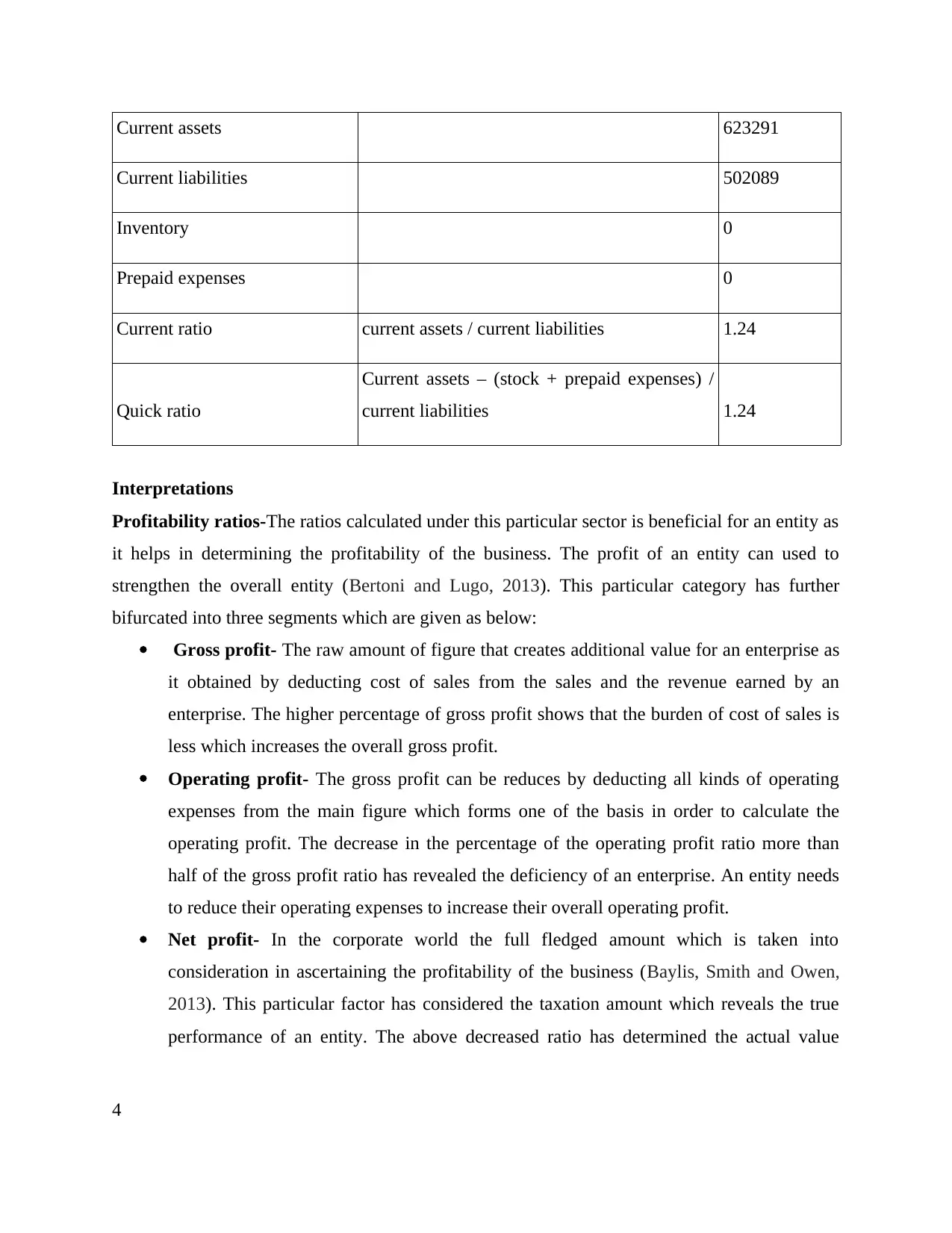
Current assets 623291
Current liabilities 502089
Inventory 0
Prepaid expenses 0
Current ratio current assets / current liabilities 1.24
Quick ratio
Current assets – (stock + prepaid expenses) /
current liabilities 1.24
Interpretations
Profitability ratios-The ratios calculated under this particular sector is beneficial for an entity as
it helps in determining the profitability of the business. The profit of an entity can used to
strengthen the overall entity (Bertoni and Lugo, 2013). This particular category has further
bifurcated into three segments which are given as below:
Gross profit- The raw amount of figure that creates additional value for an enterprise as
it obtained by deducting cost of sales from the sales and the revenue earned by an
enterprise. The higher percentage of gross profit shows that the burden of cost of sales is
less which increases the overall gross profit.
Operating profit- The gross profit can be reduces by deducting all kinds of operating
expenses from the main figure which forms one of the basis in order to calculate the
operating profit. The decrease in the percentage of the operating profit ratio more than
half of the gross profit ratio has revealed the deficiency of an enterprise. An entity needs
to reduce their operating expenses to increase their overall operating profit.
Net profit- In the corporate world the full fledged amount which is taken into
consideration in ascertaining the profitability of the business (Baylis, Smith and Owen,
2013). This particular factor has considered the taxation amount which reveals the true
performance of an entity. The above decreased ratio has determined the actual value
4
Current liabilities 502089
Inventory 0
Prepaid expenses 0
Current ratio current assets / current liabilities 1.24
Quick ratio
Current assets – (stock + prepaid expenses) /
current liabilities 1.24
Interpretations
Profitability ratios-The ratios calculated under this particular sector is beneficial for an entity as
it helps in determining the profitability of the business. The profit of an entity can used to
strengthen the overall entity (Bertoni and Lugo, 2013). This particular category has further
bifurcated into three segments which are given as below:
Gross profit- The raw amount of figure that creates additional value for an enterprise as
it obtained by deducting cost of sales from the sales and the revenue earned by an
enterprise. The higher percentage of gross profit shows that the burden of cost of sales is
less which increases the overall gross profit.
Operating profit- The gross profit can be reduces by deducting all kinds of operating
expenses from the main figure which forms one of the basis in order to calculate the
operating profit. The decrease in the percentage of the operating profit ratio more than
half of the gross profit ratio has revealed the deficiency of an enterprise. An entity needs
to reduce their operating expenses to increase their overall operating profit.
Net profit- In the corporate world the full fledged amount which is taken into
consideration in ascertaining the profitability of the business (Baylis, Smith and Owen,
2013). This particular factor has considered the taxation amount which reveals the true
performance of an entity. The above decreased ratio has determined the actual value
4
Paraphrase This Document
Need a fresh take? Get an instant paraphrase of this document with our AI Paraphraser
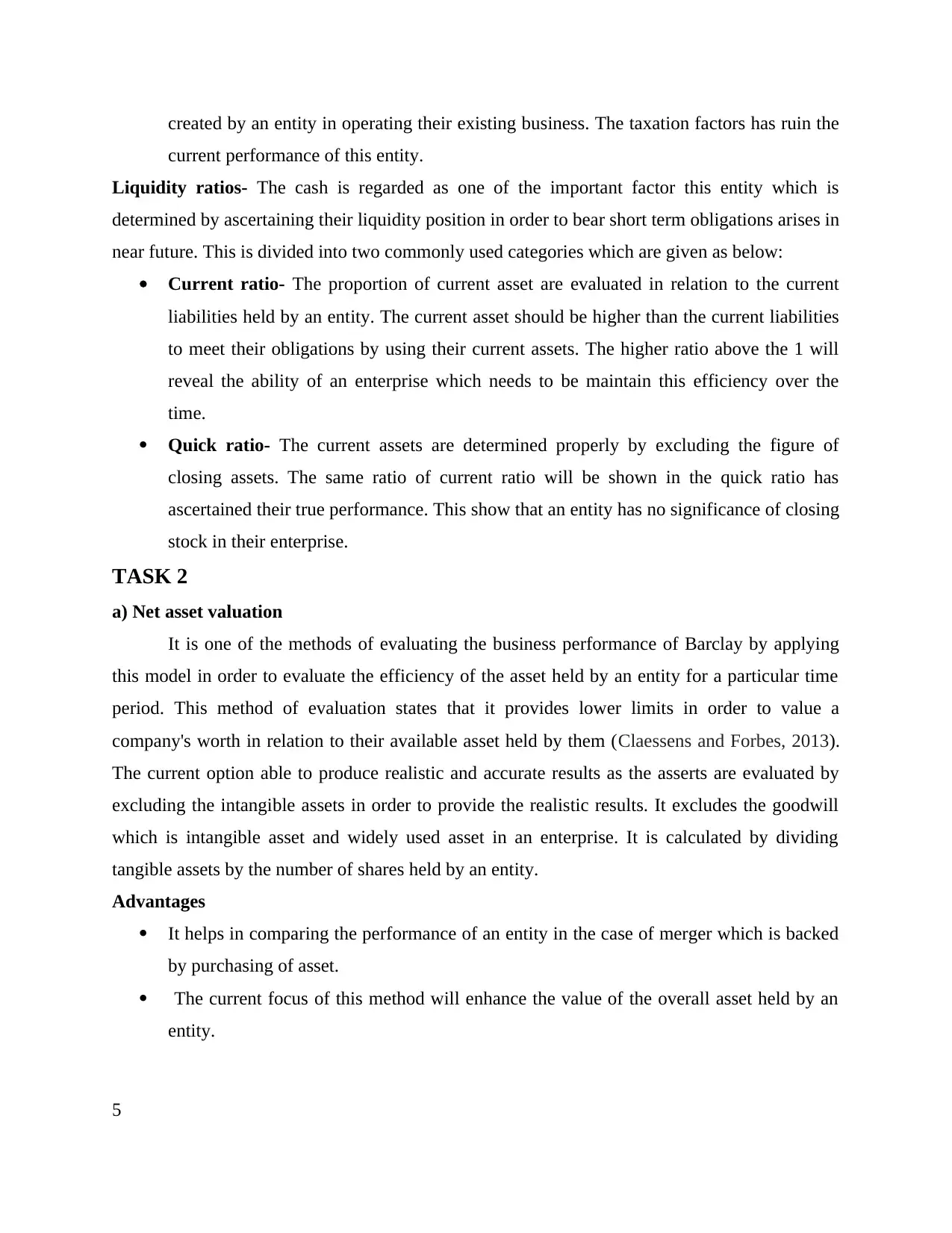
created by an entity in operating their existing business. The taxation factors has ruin the
current performance of this entity.
Liquidity ratios- The cash is regarded as one of the important factor this entity which is
determined by ascertaining their liquidity position in order to bear short term obligations arises in
near future. This is divided into two commonly used categories which are given as below:
Current ratio- The proportion of current asset are evaluated in relation to the current
liabilities held by an entity. The current asset should be higher than the current liabilities
to meet their obligations by using their current assets. The higher ratio above the 1 will
reveal the ability of an enterprise which needs to be maintain this efficiency over the
time.
Quick ratio- The current assets are determined properly by excluding the figure of
closing assets. The same ratio of current ratio will be shown in the quick ratio has
ascertained their true performance. This show that an entity has no significance of closing
stock in their enterprise.
TASK 2
a) Net asset valuation
It is one of the methods of evaluating the business performance of Barclay by applying
this model in order to evaluate the efficiency of the asset held by an entity for a particular time
period. This method of evaluation states that it provides lower limits in order to value a
company's worth in relation to their available asset held by them (Claessens and Forbes, 2013).
The current option able to produce realistic and accurate results as the asserts are evaluated by
excluding the intangible assets in order to provide the realistic results. It excludes the goodwill
which is intangible asset and widely used asset in an enterprise. It is calculated by dividing
tangible assets by the number of shares held by an entity.
Advantages
It helps in comparing the performance of an entity in the case of merger which is backed
by purchasing of asset.
The current focus of this method will enhance the value of the overall asset held by an
entity.
5
current performance of this entity.
Liquidity ratios- The cash is regarded as one of the important factor this entity which is
determined by ascertaining their liquidity position in order to bear short term obligations arises in
near future. This is divided into two commonly used categories which are given as below:
Current ratio- The proportion of current asset are evaluated in relation to the current
liabilities held by an entity. The current asset should be higher than the current liabilities
to meet their obligations by using their current assets. The higher ratio above the 1 will
reveal the ability of an enterprise which needs to be maintain this efficiency over the
time.
Quick ratio- The current assets are determined properly by excluding the figure of
closing assets. The same ratio of current ratio will be shown in the quick ratio has
ascertained their true performance. This show that an entity has no significance of closing
stock in their enterprise.
TASK 2
a) Net asset valuation
It is one of the methods of evaluating the business performance of Barclay by applying
this model in order to evaluate the efficiency of the asset held by an entity for a particular time
period. This method of evaluation states that it provides lower limits in order to value a
company's worth in relation to their available asset held by them (Claessens and Forbes, 2013).
The current option able to produce realistic and accurate results as the asserts are evaluated by
excluding the intangible assets in order to provide the realistic results. It excludes the goodwill
which is intangible asset and widely used asset in an enterprise. It is calculated by dividing
tangible assets by the number of shares held by an entity.
Advantages
It helps in comparing the performance of an entity in the case of merger which is backed
by purchasing of asset.
The current focus of this method will enhance the value of the overall asset held by an
entity.
5
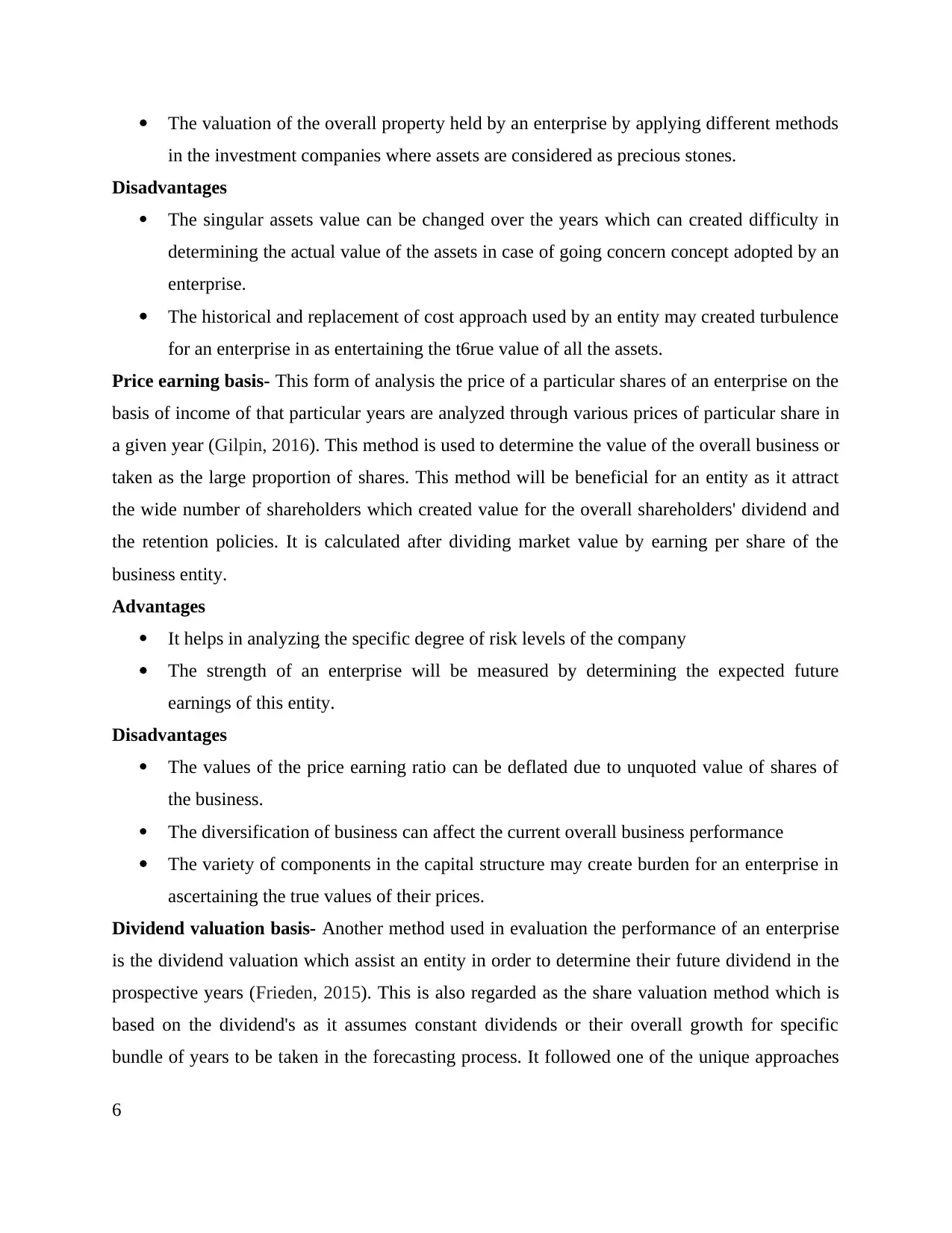
The valuation of the overall property held by an enterprise by applying different methods
in the investment companies where assets are considered as precious stones.
Disadvantages
The singular assets value can be changed over the years which can created difficulty in
determining the actual value of the assets in case of going concern concept adopted by an
enterprise.
The historical and replacement of cost approach used by an entity may created turbulence
for an enterprise in as entertaining the t6rue value of all the assets.
Price earning basis- This form of analysis the price of a particular shares of an enterprise on the
basis of income of that particular years are analyzed through various prices of particular share in
a given year (Gilpin, 2016). This method is used to determine the value of the overall business or
taken as the large proportion of shares. This method will be beneficial for an entity as it attract
the wide number of shareholders which created value for the overall shareholders' dividend and
the retention policies. It is calculated after dividing market value by earning per share of the
business entity.
Advantages
It helps in analyzing the specific degree of risk levels of the company
The strength of an enterprise will be measured by determining the expected future
earnings of this entity.
Disadvantages
The values of the price earning ratio can be deflated due to unquoted value of shares of
the business.
The diversification of business can affect the current overall business performance
The variety of components in the capital structure may create burden for an enterprise in
ascertaining the true values of their prices.
Dividend valuation basis- Another method used in evaluation the performance of an enterprise
is the dividend valuation which assist an entity in order to determine their future dividend in the
prospective years (Frieden, 2015). This is also regarded as the share valuation method which is
based on the dividend's as it assumes constant dividends or their overall growth for specific
bundle of years to be taken in the forecasting process. It followed one of the unique approaches
6
in the investment companies where assets are considered as precious stones.
Disadvantages
The singular assets value can be changed over the years which can created difficulty in
determining the actual value of the assets in case of going concern concept adopted by an
enterprise.
The historical and replacement of cost approach used by an entity may created turbulence
for an enterprise in as entertaining the t6rue value of all the assets.
Price earning basis- This form of analysis the price of a particular shares of an enterprise on the
basis of income of that particular years are analyzed through various prices of particular share in
a given year (Gilpin, 2016). This method is used to determine the value of the overall business or
taken as the large proportion of shares. This method will be beneficial for an entity as it attract
the wide number of shareholders which created value for the overall shareholders' dividend and
the retention policies. It is calculated after dividing market value by earning per share of the
business entity.
Advantages
It helps in analyzing the specific degree of risk levels of the company
The strength of an enterprise will be measured by determining the expected future
earnings of this entity.
Disadvantages
The values of the price earning ratio can be deflated due to unquoted value of shares of
the business.
The diversification of business can affect the current overall business performance
The variety of components in the capital structure may create burden for an enterprise in
ascertaining the true values of their prices.
Dividend valuation basis- Another method used in evaluation the performance of an enterprise
is the dividend valuation which assist an entity in order to determine their future dividend in the
prospective years (Frieden, 2015). This is also regarded as the share valuation method which is
based on the dividend's as it assumes constant dividends or their overall growth for specific
bundle of years to be taken in the forecasting process. It followed one of the unique approaches
6
⊘ This is a preview!⊘
Do you want full access?
Subscribe today to unlock all pages.

Trusted by 1+ million students worldwide
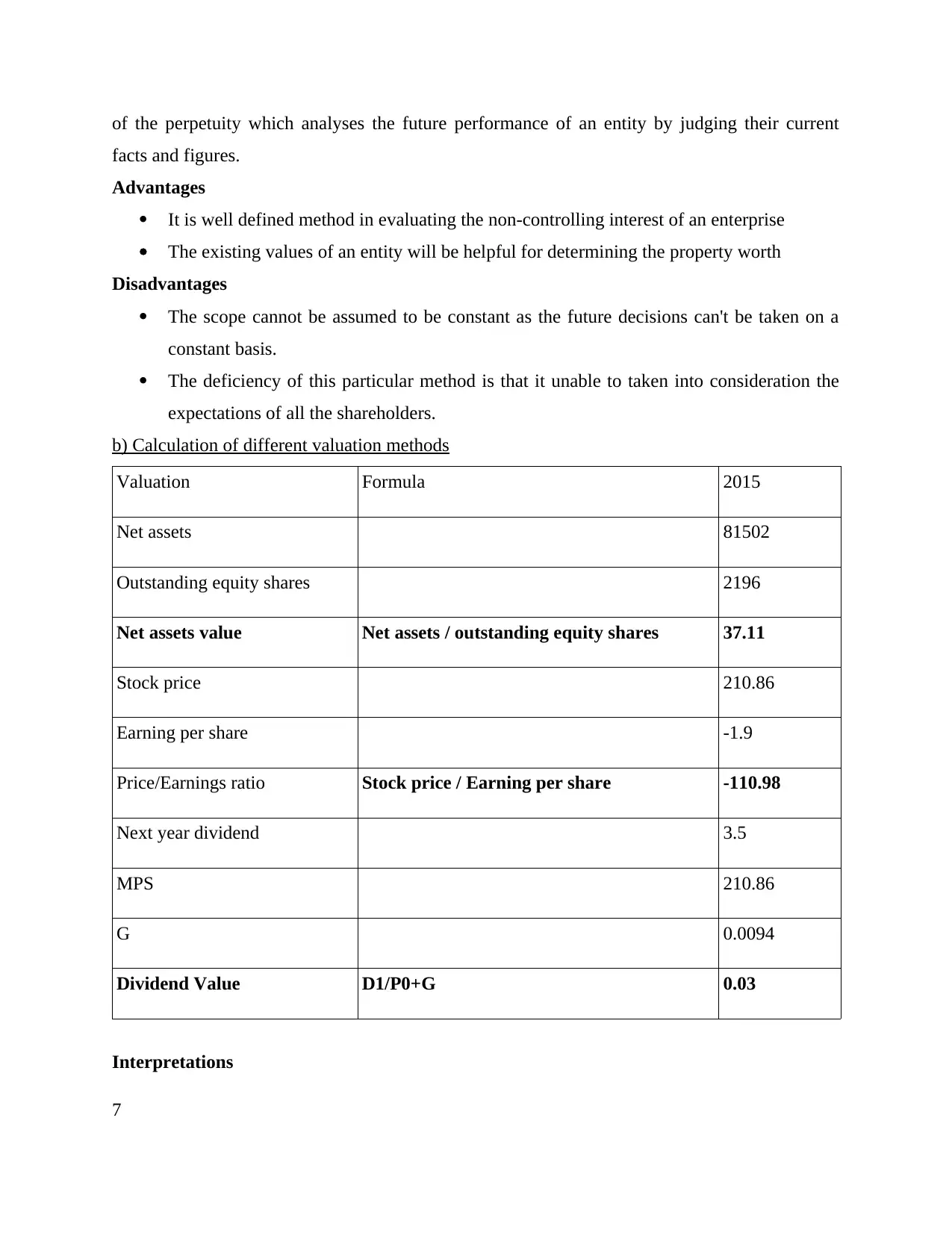
of the perpetuity which analyses the future performance of an entity by judging their current
facts and figures.
Advantages
It is well defined method in evaluating the non-controlling interest of an enterprise
The existing values of an entity will be helpful for determining the property worth
Disadvantages
The scope cannot be assumed to be constant as the future decisions can't be taken on a
constant basis.
The deficiency of this particular method is that it unable to taken into consideration the
expectations of all the shareholders.
b) Calculation of different valuation methods
Valuation Formula 2015
Net assets 81502
Outstanding equity shares 2196
Net assets value Net assets / outstanding equity shares 37.11
Stock price 210.86
Earning per share -1.9
Price/Earnings ratio Stock price / Earning per share -110.98
Next year dividend 3.5
MPS 210.86
G 0.0094
Dividend Value D1/P0+G 0.03
Interpretations
7
facts and figures.
Advantages
It is well defined method in evaluating the non-controlling interest of an enterprise
The existing values of an entity will be helpful for determining the property worth
Disadvantages
The scope cannot be assumed to be constant as the future decisions can't be taken on a
constant basis.
The deficiency of this particular method is that it unable to taken into consideration the
expectations of all the shareholders.
b) Calculation of different valuation methods
Valuation Formula 2015
Net assets 81502
Outstanding equity shares 2196
Net assets value Net assets / outstanding equity shares 37.11
Stock price 210.86
Earning per share -1.9
Price/Earnings ratio Stock price / Earning per share -110.98
Next year dividend 3.5
MPS 210.86
G 0.0094
Dividend Value D1/P0+G 0.03
Interpretations
7
Paraphrase This Document
Need a fresh take? Get an instant paraphrase of this document with our AI Paraphraser
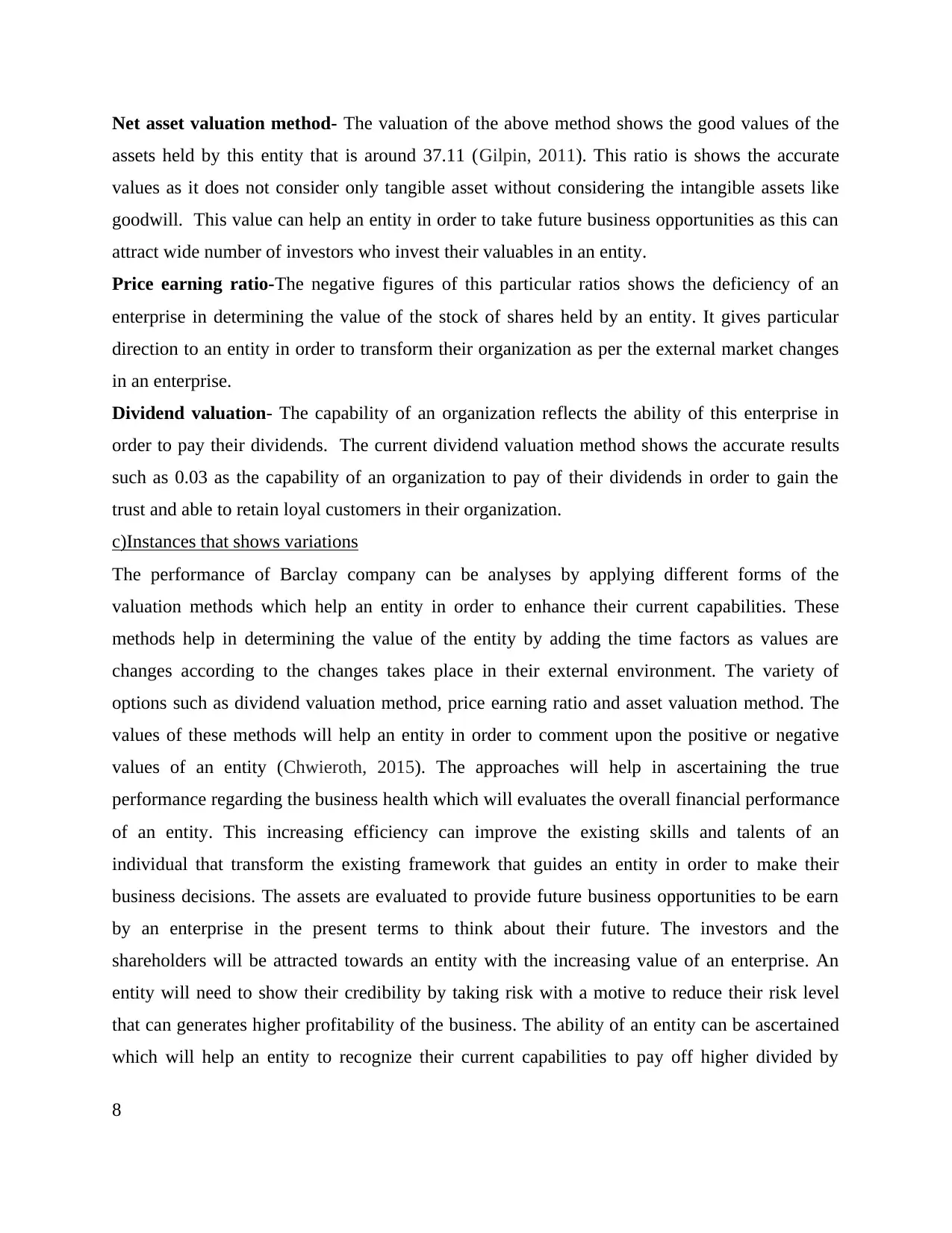
Net asset valuation method- The valuation of the above method shows the good values of the
assets held by this entity that is around 37.11 (Gilpin, 2011). This ratio is shows the accurate
values as it does not consider only tangible asset without considering the intangible assets like
goodwill. This value can help an entity in order to take future business opportunities as this can
attract wide number of investors who invest their valuables in an entity.
Price earning ratio-The negative figures of this particular ratios shows the deficiency of an
enterprise in determining the value of the stock of shares held by an entity. It gives particular
direction to an entity in order to transform their organization as per the external market changes
in an enterprise.
Dividend valuation- The capability of an organization reflects the ability of this enterprise in
order to pay their dividends. The current dividend valuation method shows the accurate results
such as 0.03 as the capability of an organization to pay of their dividends in order to gain the
trust and able to retain loyal customers in their organization.
c)Instances that shows variations
The performance of Barclay company can be analyses by applying different forms of the
valuation methods which help an entity in order to enhance their current capabilities. These
methods help in determining the value of the entity by adding the time factors as values are
changes according to the changes takes place in their external environment. The variety of
options such as dividend valuation method, price earning ratio and asset valuation method. The
values of these methods will help an entity in order to comment upon the positive or negative
values of an entity (Chwieroth, 2015). The approaches will help in ascertaining the true
performance regarding the business health which will evaluates the overall financial performance
of an entity. This increasing efficiency can improve the existing skills and talents of an
individual that transform the existing framework that guides an entity in order to make their
business decisions. The assets are evaluated to provide future business opportunities to be earn
by an enterprise in the present terms to think about their future. The investors and the
shareholders will be attracted towards an entity with the increasing value of an enterprise. An
entity will need to show their credibility by taking risk with a motive to reduce their risk level
that can generates higher profitability of the business. The ability of an entity can be ascertained
which will help an entity to recognize their current capabilities to pay off higher divided by
8
assets held by this entity that is around 37.11 (Gilpin, 2011). This ratio is shows the accurate
values as it does not consider only tangible asset without considering the intangible assets like
goodwill. This value can help an entity in order to take future business opportunities as this can
attract wide number of investors who invest their valuables in an entity.
Price earning ratio-The negative figures of this particular ratios shows the deficiency of an
enterprise in determining the value of the stock of shares held by an entity. It gives particular
direction to an entity in order to transform their organization as per the external market changes
in an enterprise.
Dividend valuation- The capability of an organization reflects the ability of this enterprise in
order to pay their dividends. The current dividend valuation method shows the accurate results
such as 0.03 as the capability of an organization to pay of their dividends in order to gain the
trust and able to retain loyal customers in their organization.
c)Instances that shows variations
The performance of Barclay company can be analyses by applying different forms of the
valuation methods which help an entity in order to enhance their current capabilities. These
methods help in determining the value of the entity by adding the time factors as values are
changes according to the changes takes place in their external environment. The variety of
options such as dividend valuation method, price earning ratio and asset valuation method. The
values of these methods will help an entity in order to comment upon the positive or negative
values of an entity (Chwieroth, 2015). The approaches will help in ascertaining the true
performance regarding the business health which will evaluates the overall financial performance
of an entity. This increasing efficiency can improve the existing skills and talents of an
individual that transform the existing framework that guides an entity in order to make their
business decisions. The assets are evaluated to provide future business opportunities to be earn
by an enterprise in the present terms to think about their future. The investors and the
shareholders will be attracted towards an entity with the increasing value of an enterprise. An
entity will need to show their credibility by taking risk with a motive to reduce their risk level
that can generates higher profitability of the business. The ability of an entity can be ascertained
which will help an entity to recognize their current capabilities to pay off higher divided by
8
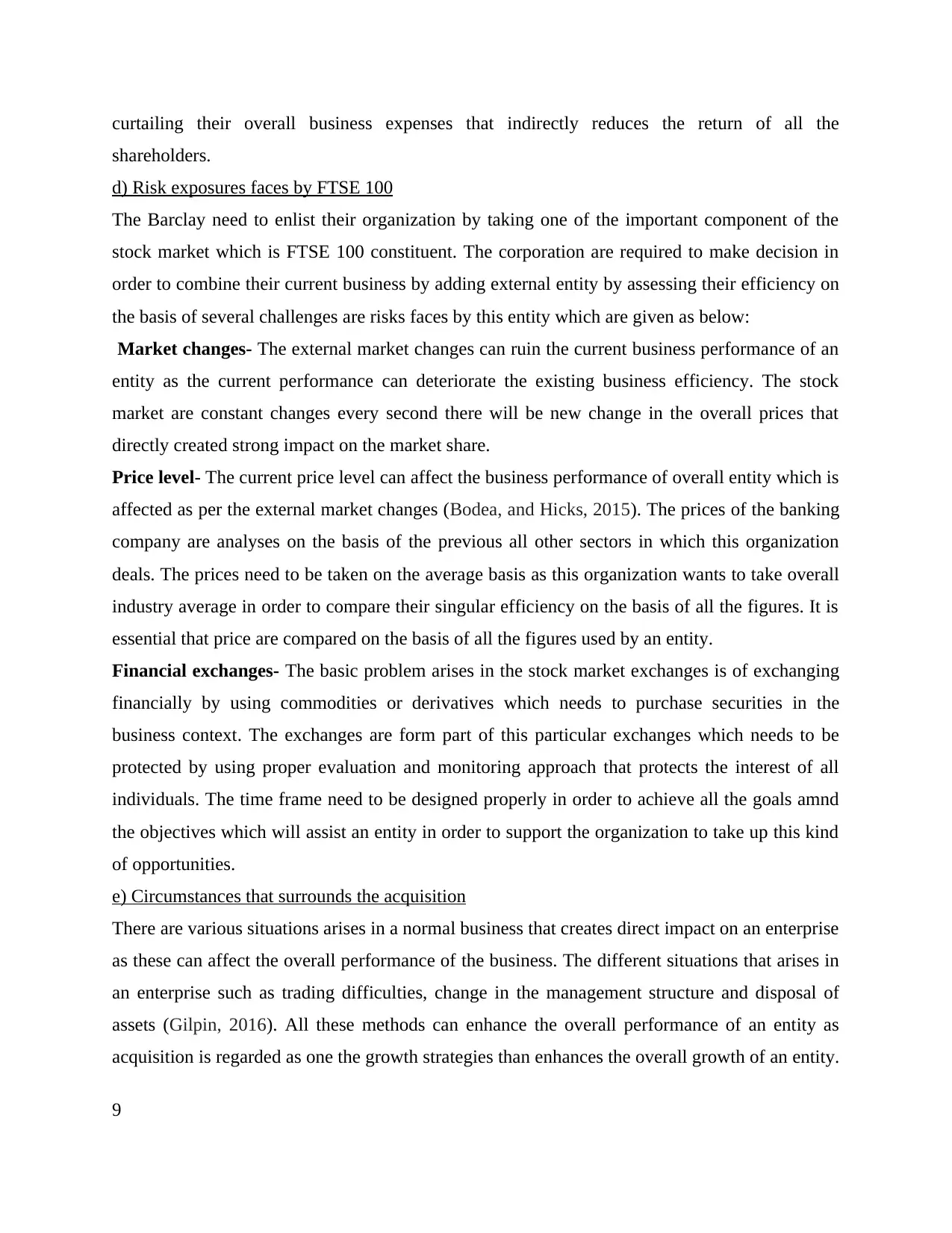
curtailing their overall business expenses that indirectly reduces the return of all the
shareholders.
d) Risk exposures faces by FTSE 100
The Barclay need to enlist their organization by taking one of the important component of the
stock market which is FTSE 100 constituent. The corporation are required to make decision in
order to combine their current business by adding external entity by assessing their efficiency on
the basis of several challenges are risks faces by this entity which are given as below:
Market changes- The external market changes can ruin the current business performance of an
entity as the current performance can deteriorate the existing business efficiency. The stock
market are constant changes every second there will be new change in the overall prices that
directly created strong impact on the market share.
Price level- The current price level can affect the business performance of overall entity which is
affected as per the external market changes (Bodea, and Hicks, 2015). The prices of the banking
company are analyses on the basis of the previous all other sectors in which this organization
deals. The prices need to be taken on the average basis as this organization wants to take overall
industry average in order to compare their singular efficiency on the basis of all the figures. It is
essential that price are compared on the basis of all the figures used by an entity.
Financial exchanges- The basic problem arises in the stock market exchanges is of exchanging
financially by using commodities or derivatives which needs to purchase securities in the
business context. The exchanges are form part of this particular exchanges which needs to be
protected by using proper evaluation and monitoring approach that protects the interest of all
individuals. The time frame need to be designed properly in order to achieve all the goals amnd
the objectives which will assist an entity in order to support the organization to take up this kind
of opportunities.
e) Circumstances that surrounds the acquisition
There are various situations arises in a normal business that creates direct impact on an enterprise
as these can affect the overall performance of the business. The different situations that arises in
an enterprise such as trading difficulties, change in the management structure and disposal of
assets (Gilpin, 2016). All these methods can enhance the overall performance of an entity as
acquisition is regarded as one the growth strategies than enhances the overall growth of an entity.
9
shareholders.
d) Risk exposures faces by FTSE 100
The Barclay need to enlist their organization by taking one of the important component of the
stock market which is FTSE 100 constituent. The corporation are required to make decision in
order to combine their current business by adding external entity by assessing their efficiency on
the basis of several challenges are risks faces by this entity which are given as below:
Market changes- The external market changes can ruin the current business performance of an
entity as the current performance can deteriorate the existing business efficiency. The stock
market are constant changes every second there will be new change in the overall prices that
directly created strong impact on the market share.
Price level- The current price level can affect the business performance of overall entity which is
affected as per the external market changes (Bodea, and Hicks, 2015). The prices of the banking
company are analyses on the basis of the previous all other sectors in which this organization
deals. The prices need to be taken on the average basis as this organization wants to take overall
industry average in order to compare their singular efficiency on the basis of all the figures. It is
essential that price are compared on the basis of all the figures used by an entity.
Financial exchanges- The basic problem arises in the stock market exchanges is of exchanging
financially by using commodities or derivatives which needs to purchase securities in the
business context. The exchanges are form part of this particular exchanges which needs to be
protected by using proper evaluation and monitoring approach that protects the interest of all
individuals. The time frame need to be designed properly in order to achieve all the goals amnd
the objectives which will assist an entity in order to support the organization to take up this kind
of opportunities.
e) Circumstances that surrounds the acquisition
There are various situations arises in a normal business that creates direct impact on an enterprise
as these can affect the overall performance of the business. The different situations that arises in
an enterprise such as trading difficulties, change in the management structure and disposal of
assets (Gilpin, 2016). All these methods can enhance the overall performance of an entity as
acquisition is regarded as one the growth strategies than enhances the overall growth of an entity.
9
⊘ This is a preview!⊘
Do you want full access?
Subscribe today to unlock all pages.

Trusted by 1+ million students worldwide
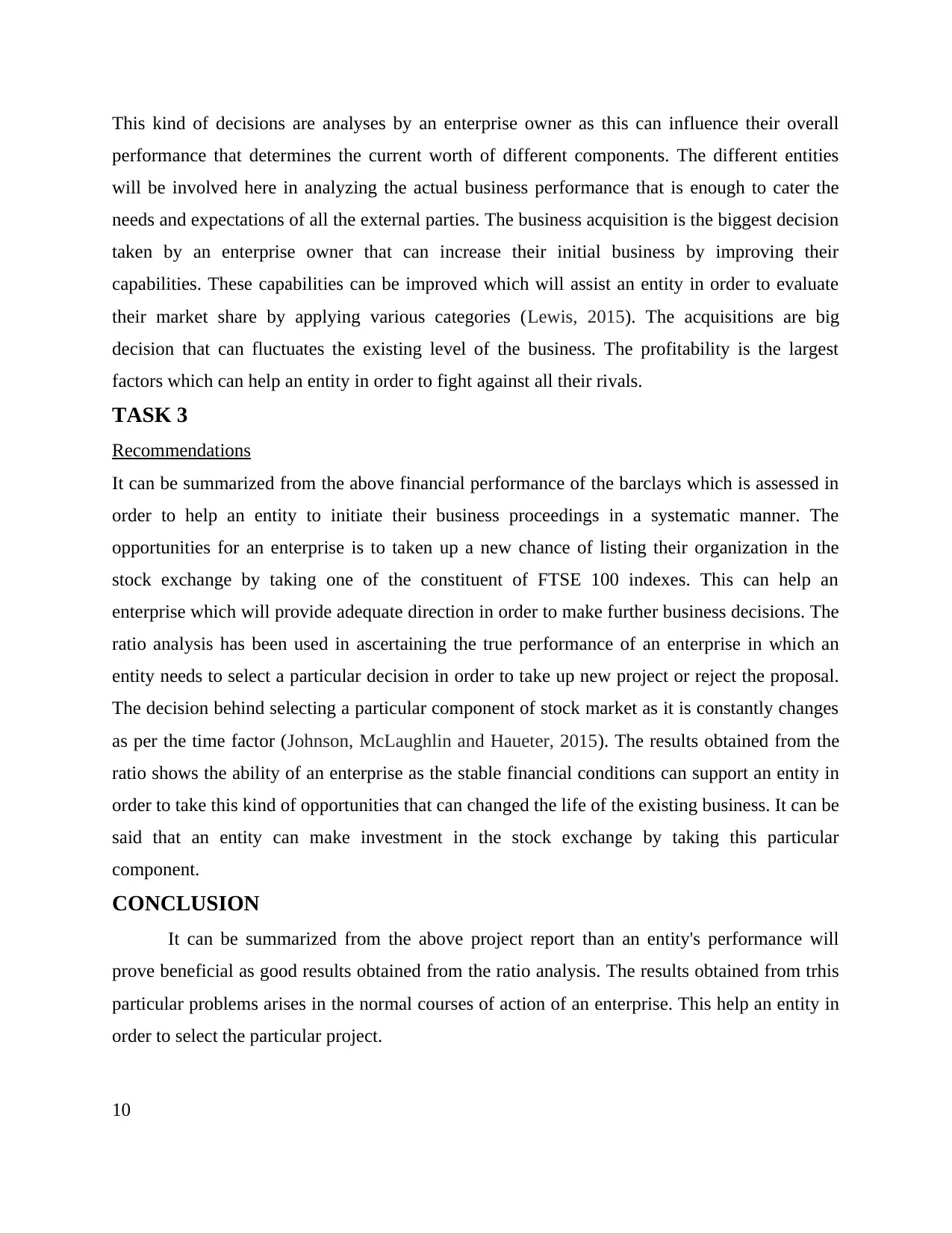
This kind of decisions are analyses by an enterprise owner as this can influence their overall
performance that determines the current worth of different components. The different entities
will be involved here in analyzing the actual business performance that is enough to cater the
needs and expectations of all the external parties. The business acquisition is the biggest decision
taken by an enterprise owner that can increase their initial business by improving their
capabilities. These capabilities can be improved which will assist an entity in order to evaluate
their market share by applying various categories (Lewis, 2015). The acquisitions are big
decision that can fluctuates the existing level of the business. The profitability is the largest
factors which can help an entity in order to fight against all their rivals.
TASK 3
Recommendations
It can be summarized from the above financial performance of the barclays which is assessed in
order to help an entity to initiate their business proceedings in a systematic manner. The
opportunities for an enterprise is to taken up a new chance of listing their organization in the
stock exchange by taking one of the constituent of FTSE 100 indexes. This can help an
enterprise which will provide adequate direction in order to make further business decisions. The
ratio analysis has been used in ascertaining the true performance of an enterprise in which an
entity needs to select a particular decision in order to take up new project or reject the proposal.
The decision behind selecting a particular component of stock market as it is constantly changes
as per the time factor (Johnson, McLaughlin and Haueter, 2015). The results obtained from the
ratio shows the ability of an enterprise as the stable financial conditions can support an entity in
order to take this kind of opportunities that can changed the life of the existing business. It can be
said that an entity can make investment in the stock exchange by taking this particular
component.
CONCLUSION
It can be summarized from the above project report than an entity's performance will
prove beneficial as good results obtained from the ratio analysis. The results obtained from trhis
particular problems arises in the normal courses of action of an enterprise. This help an entity in
order to select the particular project.
10
performance that determines the current worth of different components. The different entities
will be involved here in analyzing the actual business performance that is enough to cater the
needs and expectations of all the external parties. The business acquisition is the biggest decision
taken by an enterprise owner that can increase their initial business by improving their
capabilities. These capabilities can be improved which will assist an entity in order to evaluate
their market share by applying various categories (Lewis, 2015). The acquisitions are big
decision that can fluctuates the existing level of the business. The profitability is the largest
factors which can help an entity in order to fight against all their rivals.
TASK 3
Recommendations
It can be summarized from the above financial performance of the barclays which is assessed in
order to help an entity to initiate their business proceedings in a systematic manner. The
opportunities for an enterprise is to taken up a new chance of listing their organization in the
stock exchange by taking one of the constituent of FTSE 100 indexes. This can help an
enterprise which will provide adequate direction in order to make further business decisions. The
ratio analysis has been used in ascertaining the true performance of an enterprise in which an
entity needs to select a particular decision in order to take up new project or reject the proposal.
The decision behind selecting a particular component of stock market as it is constantly changes
as per the time factor (Johnson, McLaughlin and Haueter, 2015). The results obtained from the
ratio shows the ability of an enterprise as the stable financial conditions can support an entity in
order to take this kind of opportunities that can changed the life of the existing business. It can be
said that an entity can make investment in the stock exchange by taking this particular
component.
CONCLUSION
It can be summarized from the above project report than an entity's performance will
prove beneficial as good results obtained from the ratio analysis. The results obtained from trhis
particular problems arises in the normal courses of action of an enterprise. This help an entity in
order to select the particular project.
10
Paraphrase This Document
Need a fresh take? Get an instant paraphrase of this document with our AI Paraphraser

11
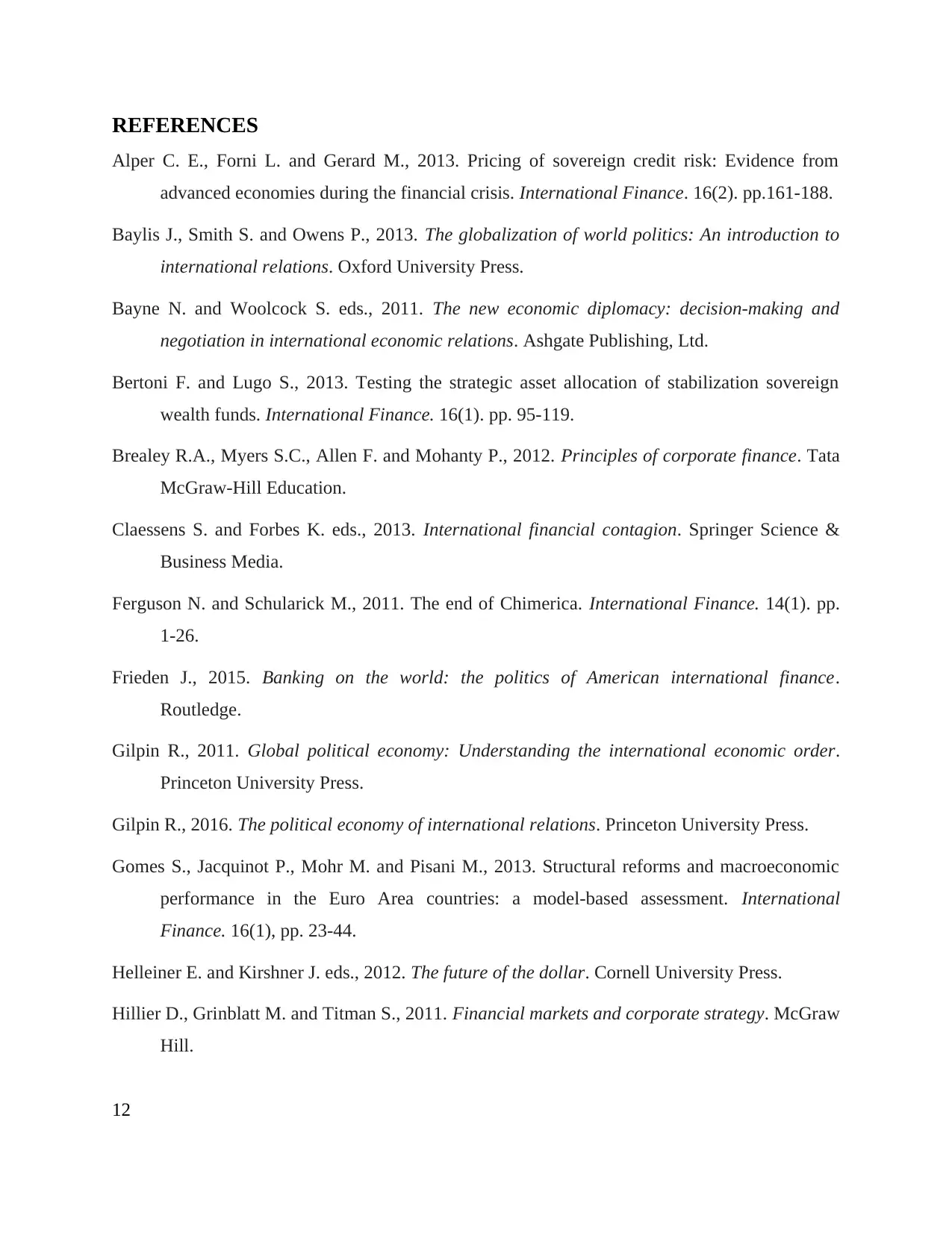
REFERENCES
Alper C. E., Forni L. and Gerard M., 2013. Pricing of sovereign credit risk: Evidence from
advanced economies during the financial crisis. International Finance. 16(2). pp.161-188.
Baylis J., Smith S. and Owens P., 2013. The globalization of world politics: An introduction to
international relations. Oxford University Press.
Bayne N. and Woolcock S. eds., 2011. The new economic diplomacy: decision-making and
negotiation in international economic relations. Ashgate Publishing, Ltd.
Bertoni F. and Lugo S., 2013. Testing the strategic asset allocation of stabilization sovereign
wealth funds. International Finance. 16(1). pp. 95-119.
Brealey R.A., Myers S.C., Allen F. and Mohanty P., 2012. Principles of corporate finance. Tata
McGraw-Hill Education.
Claessens S. and Forbes K. eds., 2013. International financial contagion. Springer Science &
Business Media.
Ferguson N. and Schularick M., 2011. The end of Chimerica. International Finance. 14(1). pp.
1-26.
Frieden J., 2015. Banking on the world: the politics of American international finance.
Routledge.
Gilpin R., 2011. Global political economy: Understanding the international economic order.
Princeton University Press.
Gilpin R., 2016. The political economy of international relations. Princeton University Press.
Gomes S., Jacquinot P., Mohr M. and Pisani M., 2013. Structural reforms and macroeconomic
performance in the Euro Area countries: a model‐based assessment. International
Finance. 16(1), pp. 23-44.
Helleiner E. and Kirshner J. eds., 2012. The future of the dollar. Cornell University Press.
Hillier D., Grinblatt M. and Titman S., 2011. Financial markets and corporate strategy. McGraw
Hill.
12
Alper C. E., Forni L. and Gerard M., 2013. Pricing of sovereign credit risk: Evidence from
advanced economies during the financial crisis. International Finance. 16(2). pp.161-188.
Baylis J., Smith S. and Owens P., 2013. The globalization of world politics: An introduction to
international relations. Oxford University Press.
Bayne N. and Woolcock S. eds., 2011. The new economic diplomacy: decision-making and
negotiation in international economic relations. Ashgate Publishing, Ltd.
Bertoni F. and Lugo S., 2013. Testing the strategic asset allocation of stabilization sovereign
wealth funds. International Finance. 16(1). pp. 95-119.
Brealey R.A., Myers S.C., Allen F. and Mohanty P., 2012. Principles of corporate finance. Tata
McGraw-Hill Education.
Claessens S. and Forbes K. eds., 2013. International financial contagion. Springer Science &
Business Media.
Ferguson N. and Schularick M., 2011. The end of Chimerica. International Finance. 14(1). pp.
1-26.
Frieden J., 2015. Banking on the world: the politics of American international finance.
Routledge.
Gilpin R., 2011. Global political economy: Understanding the international economic order.
Princeton University Press.
Gilpin R., 2016. The political economy of international relations. Princeton University Press.
Gomes S., Jacquinot P., Mohr M. and Pisani M., 2013. Structural reforms and macroeconomic
performance in the Euro Area countries: a model‐based assessment. International
Finance. 16(1), pp. 23-44.
Helleiner E. and Kirshner J. eds., 2012. The future of the dollar. Cornell University Press.
Hillier D., Grinblatt M. and Titman S., 2011. Financial markets and corporate strategy. McGraw
Hill.
12
⊘ This is a preview!⊘
Do you want full access?
Subscribe today to unlock all pages.

Trusted by 1+ million students worldwide
1 out of 12
Related Documents
Your All-in-One AI-Powered Toolkit for Academic Success.
+13062052269
info@desklib.com
Available 24*7 on WhatsApp / Email
![[object Object]](/_next/static/media/star-bottom.7253800d.svg)
Unlock your academic potential
Copyright © 2020–2026 A2Z Services. All Rights Reserved. Developed and managed by ZUCOL.





